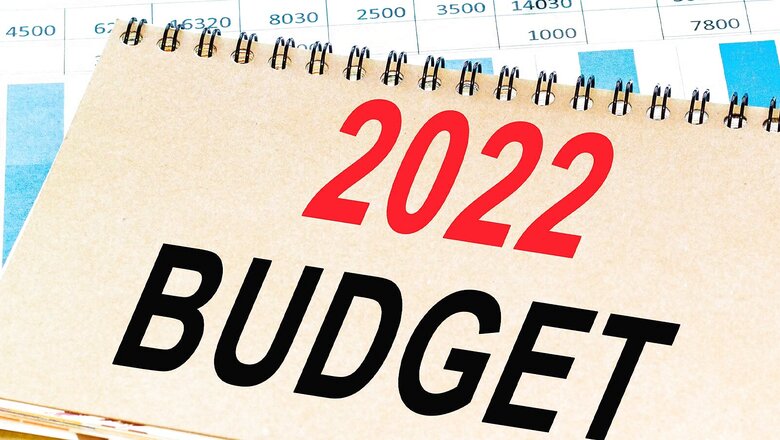
views
Finance Minister Nirmala Sitharaman on February 1 will present her fourth Union Budget. The Union Budget 2022 is coming at a time when India is grappling with the Omicron variant of Covid-19, leading to a stressed economy. Economists are expecting measures that support growth and also allow the government to reduce its deficits and debt accumulation at the same time.
Here are Some Key Areas that Finance Minister Nirmala Sitharaman Could Focus on Union Budget 2022
Fiscal Deficit Target
India’s fiscal deficit target for the new year will be closely watched by investors and ratings agencies. A fiscal deficit is a gap between a government’s income and spending, and it implies that the country is spending more than its revenue. India plans to set its deficit target between 6.3 per cent to 6.5 per cent of GDP, local media reported, citing several government officials. That’s a touch lower than the current year’s target of 6.8 per cent, which Sitharaman previously said was necessary to get the Indian economy back on track after the Covid outbreak derailed growth.
Also Read: Union Budget 2022 Live Updates: Will FM Sitharaman Present a Populist Budget this Year?
Income Tax Slabs Rejig, Hike in NPS, Standard Deductions Limit
One of the most keenly awaited announcements in the union budget every year is related to personal taxation. In every budget income tax rates and slabs are reviewed. However, the income tax slabs have not been changed since 2014. Will Finance minister Nirmala Sitharaman change the income slabs and give relief to taxpayers in the Union Budget on Tuesday?
The expected relief include an increase in the basic exemption limit from Rs 2.5 lakh to Rs 3 lakh. For senior citizens, it is likely to be increased to Rs 3.5 lakh from the present Rs 3 lakh. The top income slab is also likely to be revised upward from the existing Rs 15 lakh.
The limit for deduction under Section 80C has also remained unchanged since 2014. In the 2014 budget, the 80C deduction limit was increased to Rs 1.5 lakh from Rs 1 lakh, while the deduction limits for interest on the home loan was increased to Rs 2 lakh from Rs 1.5 lakh. Both these deductions remain unchanged since 2014. However, some additional deductions have been introduced in the subsequent budgets.
In the 2015 budget, the government introduced an additional deduction of Rs 50,000 for contribution under the National Pension Scheme (NPS) under Section 80 CCD. The deduction limit on health insurance premiums was also increased from Rs 15,000 to Rs 25,000. Major steps towards simplification and rationalisation of the income tax regime are also expected in this year’s budget.
Real Estate Sector: What will be there for Homebuyers?
It is amid the pandemic itself when the real estate sector has seen certain innovations and shifts which we can absolutely believe will aid the sector’s growth in the forthcoming years. With the sector striving to overcome the pandemic, from the upcoming budget 2022 we expect, the existing tax exemption on housing loans should be raised. Further, the budget could also focus on investments in infrastructure and capacity building.
“The residential sector looks forward to further support beyond the mainstay demands of industry status, easy availability of finance, and GST rates reduction. With regards to the upcoming Union Budget 2022-23, some of the significant moves which would help spur up residential demand include tax rebates on housing loan interest rates, deductions for home loan principal repayment, over and above the existing 80C, extend benefits of affordable housing, etc,” said Anuj Puri, chairman, ANAROCK.
Work from Allowance: Will FM Introduce it Budget 2022?
Hit hard by the rising inflation, Covid-induced lockdowns, job loss and salary cuts, individual taxpayers are hoping for a populist budget that will help reduce their tax burden and leave more money at their disposal. “The Budget 2021 may introduce tax-free work from home allowances for salaried employees. Allowing deductions for such expenses will raise the take-home salary, ultimately creating demand for goods and services in the country,” Archit Gupta, Founder and CEO, ClearTax. In the face of rising inflation and waning average per capita incomes, the salaried class will be looking to Finance Minister Nirmala Sitharaman to provide some relief in Budget 2022.
Further, the salaried class is beset with new WFH expenses, will be expecting the central government to include some tax relief related to work-from-home expenses.
Indirect Taxation
Rationalisation of Customs duty structure for EV and ancillary components, renewable energy generation devices, and related components is likely. Sector-specific concessions for semi-conductor manufacturers with a focus on exports are expected.
Budget allocations for the expansion of the PLI scheme for sectors such as leather and laminates; additional incentive schemes will also lure companies into setting up additional manufacturing in sectors that were not the focus in previous budgets and help reverse the impact of the pandemic.
The Centre is already reviewing 400 customs duty exemptions (as announced in the previous budget). The final list is expected to be proposed as part of the 2022 budget and industry is awaiting it so that there is no adverse impact on trade as a result of this exercise.
Extension of customs duty exemption on goods imported for testing, and setting up of a customs dispute resolution forum, ease compliances under customs, and integration of the current ICEGATE, DGFT and SEZ online portal into a common digital platform.
Restoring jobs and Other Reforms
Other likely budget priorities would include restoring jobs, supporting sectors disproportionately affected by the pandemic, banking sector reforms, climate policies as well as measures for the health and education sectors, according to economists. The government needs policies to revive and support the micro-, small- and medium-scale businesses, which are the biggest job creators in India, according to Rumki Majumdar, an economist at Deloitte.
“Identifying their pain areas and devising a solution to help them become a part of ‘Atmanirbhar Bharat’ will aid in their recovery,” she wrote. Atmanirbhar Bharat is a campaign that’s part of the government’s policy push to make India more self-reliant. “In addition, access to credit is critical, and providing targeted credit support to these enterprises should be considered,” Majumdar added.
Read all the Latest Business News here



















Comments
0 comment